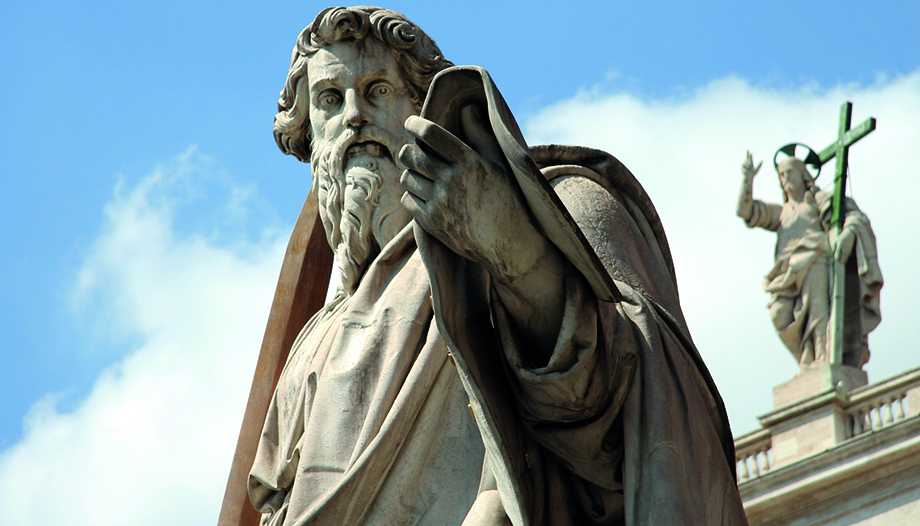After having spoken of the mystery of the Church in which it is necessary to believe, the Letter to the Ephesians goes on to explain that this mystery is the mystery of the Church. to be lived (Eph 4:1 - 6:17). This Christian life has an ecclesial character and is presented as the life of the new man and of the children of light. The principles governing it are given in Eph 4:20-24 (cf. Col 3:5-10); the following verses will illustrate these principles with what to avoid and what to do (Eph 4:25 - 5:20).
Not the way pagans live
"Therefore this I say and testify in the Lord, that you no longer live as the Gentiles live, in their vain thoughts, their minds darkened, their minds alienated from the life of God, because of the ignorance in which they are blinded by the blindness of their hearts. Indolent, they have given themselves over to perversion, to work all uncleanness with greediness." (Eph 4:17-19).
The new life of the Gentile believersThe letter is primarily addressed to them, and is presented in opposition to the behavior of the "Gentiles who do not believe in Christ".. This life is characterized by "to have a darkened mind". and by "living apart from God".. The new life does not imply a change of identity (they are still gentiles), but of mentality and behavior (they are no longer to live as pagans).
The reason why unbelieving Gentiles lead such a life is to be found in the "ignorance" and in the "hardening" of their hearts. And hence his action: "indolence, perversion e impurity". These words take up biblical and Jewish ways of seeing (Wis 14:22; 15:11; Philo, Decalogue 8; Flavius Josephus, Jewish Antiques 10:142), also present in the New Testament (Acts 17:30; 1 Pet. 1:14; 2:15; cf. Rom. 1:21-24).
To renew yourselves and to clothe yourselves
"You, on the other hand, this is not how you have learned Christ.-if indeed you have heard him and have been taught according to the truth which is in Jesus, to forsake the former conversation of the old man, which is corrupt according to his seductive lust, to be renewed in the spirit of your mind and to put on the new man, which is created according to God in true righteousness and holiness." (Eph 4:20-24).
The new life of the believers is underlined by the contrast with the life of the pagans. These vv. 20-24 are, thus, in opposition to v. 18: in front of the ignorance (guilty = hardheartedness) of the heathen is spoken of the knowledge of Christ. Next, the to act as a Christian (Eph 4, 25 - 5, 20) will be contrasted with the heathenish conduct described in Eph 4:19.
The letter establishes an essential relationship between the new life and the knowledge of Christ. These vv. 20-24 refer, with insistence, to baptismal catechesis: "you have learned, have you heard, you have been taught".. The letter uses the expression learning Christ to emphasize that the purpose of catechesis is to present a living person to be known and to have a personal relationship with, Christ, in whom we read the divine plan for humanity (cf. 1 Cor 2:2; Gal 2:20; Phil 1:21). Christ is the Gospel that you have heard and that you have been taught, a Risen One who cannot be separated from Jesus, son of Mary, who lived among men, was rejected and died on the cross. That man, who is the truth of the glorious Christ, is the one they must learn to know. Knowledge of Jesus Christ is thus necessary not only for ecclesial growth, but is also the foundation of the moral conduct of believers, since in him we form a new man.
The content of the education received refers to leave, renew y coat. First of all, we talk about the negativeIt is necessary to get rid of the old man, that is, of everything that, according to Col 3:8, is anger, passion, malice, blasphemy and dishonest conversation. Then it speaks of what positivein frontal opposition to v. 17: the pagans are governed by vain thoughtswhereas being a Christian is characterized by a spiritual renewal of intelligenceThis is to say, of the higher part of the intelligence. Thanks to this, the believer will be able to know Christ and put on the new man (cf. 1 Thess 5:8; Gal 3:27; Rom 13:14; 1 Cor 15:43, 53-54; 2 Cor 5:3-4; Col 3:10; Eph 6:11). The expression "who has been created according to God".which refers to the creation of Adam (cf. Wis 9:1-3; 2:23; Si 17:1; 33:10), confirms that the creator of the new humanity is Christ himself, thus fulfilling God's plan for humanity.
The image of the coatFinally, it does not refer to something merely external, as is the case with clothes. The letter speaks of a divest and a coatThis is in reference to moral change, because the way of acting expresses, like clothing, the personality, the way of being of a person. And to make it clear that it is not something external, Paul adds of the "new man"The believer is clothed with a new being, renewed by Christ, as an individual person and as a member of the Church. It is in this way that the Christian will become the light of the world (Eph 5:8), before whom darkness will be removed, inasmuch as he is risen with Christ and illuminated by him (Eph 5:14).
Professor of New Testament, University of Navarra.











